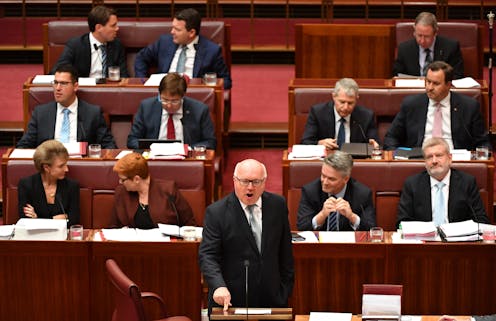Labor is right to block 'religious freedom' amendments to protect same-sex marriage bill
- Written by Anja Hilkemeijer, Lecturer in Law, University of Tasmania

The federal Labor caucus has agreed to vote collectively to defeat all substantive amendments proposed to the same-sex marriage bill proposed by Liberal Dean Smith.
This collective move by Labor makes redundant the amendments proposed by conservatives and the Greens. Substantive amendments to add additional “protections” for religious freedom into the bill could only pass with the support of about six Labor senators.
An examination of yesterday’s proposed amendment from Attorney-General George Brandis demonstrates why today’s outcome should be welcomed.
The Brandis amendment – a green light for discrimination
During yesterday’s debate, Brandis tabled an amendment to incorporate an absolute right to religious freedom into Australian law. This amendment would have added to the marriage reform bill an element of the right to freedom of religion:
Nothing in this Act limits or derogates from the right of any person, in a lawful manner, to manifest his or her religion or belief in worship, observance, practice and teaching.
This proposed provision is drawn from Article 18(1) of the International Covenant on Civil and Political Rights (ICCPR).
Read more: As Australians say ‘yes’ to marriage equality, the legal stoush over human rights takes centre stage
Enacting this provision into legislation would turn a limited right to freedom of religion under international law into an absolute right under Australian law. Notably, the proposal omits the content of Article 18(3) of the ICCPR:
Freedom to manifest one’s religion or beliefs may be subject only to such limitations as are prescribed by law and are necessary to protect public safety, order, health, or morals or the fundamental rights and freedoms of others.
The limitation on freedom of religion expressed in Article 18(3) is an essential check on the capacity of one human right to disproportionately limit the exercise of other rights. In the context of marriage reform, any concessions for freedom of religion must be balanced against rights to equality and nondiscrimination.
This understanding of the need to balance rights claims has influenced courts in Australia and overseas. Efforts to discriminate against same-sex couples on the basis of religious belief – for example in the provision of accommodation or other services – have been ruled invalid.
The Brandis amendment could have permitted divisive litigation initiated by opponents of same-sex marriage. Previous such actions overseas have seen conservative Christians arguing that providing adoption and accommodation services to same sex couples or selling cakes and flowers for same sex weddings interferes with their free practice of religion.
The justification for such arguments is that discrimination in the provision of goods and services should be permissible to avoid complicity in something that, according to their faith, is “sinful”.
Freedom of religion as a legislative Trojan horse
Passage of the Brandis amendment would support an argument that freedom to discriminate on the basis of belief is absolute. This could easily extend from the commercial sector to the welfare sector, and create new instances of discrimination in relation to same-sex family relationships.
The Trojan horse effect of the proposal is amplified by the increasingly wide interpretation of the words “worship, observance, practice and teaching” among conservative Christians. In this conception, faith extends to every aspect of a person’s life, including their dealings with others in the public sphere.
Read more: Going overboard on religious protections could come back to bite in multicultural Australia
This is at odds with religious freedom under international law. The right to religious freedom does not protect every act inspired or motivated by a belief. Instead, there must be an “intimate link” between the action taken and the belief.
In practice, a refusal to sell cakes or provide other services would not fit within this restricted protection.
Brandis’ suggestion that his proposed amendment is a mere “declaratory statement” is misleading. The right to religion, like most other rights, is not protected by Australian legislation.
Australia has an international obligation to protect the full range of human rights. However, most of these are not implemented in Australian law. Some human rights protection is offered under the common law. But this is subject to contrary legislation.
Since freedom of religion is currently not legislated for in Australia, the Brandis amendment is not declaratory at all. Rather, it would convert a common law right into a statutory one. This would privilege religious freedom over other rights.
Freedom of religion is a shield to protect religious minorities from discrimination. It is not, and never has been, a sword to justify discrimination against others.
Next steps for marriage equality and religious freedom
The likely passage of the Smith bill, unamended, does not end discussion of how marriage equality and religious freedom will interact under Australian law. Conservatives will maintain this debate in coming months as the Government’s panel on religious freedom commences its work.
At the same time, a parliamentary committee is due to report. It has examined freedom of religion issues for the past year. The chair of that committee, Senator David Fawcett, has indicated a likely recommendation for positive protection of religious freedom.
The marriage reform bill is not the only element of this process that will require continued human rights scrutiny. As shown above, partial implementation of religious freedom makes no sense in the context of international law.
Australia seems set for a debate about the domestic protection of human rights. The appropriate way to achieve this is to incorporate the full range of Australia’s obligations. Rights claims may then be assessed in balance with each other.
Authors: Anja Hilkemeijer, Lecturer in Law, University of Tasmania





